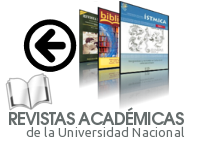The main attributes of a quality teacher: the social representations of students and graduates of the Liceo Colonia Puntarenas, Costa Rica
DOI:
https://doi.org/10.15359/rp.26.3Keywords:
educational quality, social representations, learning, teaching, teachers, Social StudiesAbstract
This article explores the social representations of the students of the Liceo Colonia Puntarenas (cantón de Upala), as well as the perceptions of the students who graduated from this same institution. The second group is studying the first or second year of career, both in public and private universities. It is interesting to interpret the social representations about what they understand by a quality teacher. The goal is to provide inputs to create an educator profile that is closer to the vision of the students. Future inquiries will delve into aspects related, specifically, to the area of Social Studies. This analytical exercise is considered an exploratory first stage. This work is part of the project for the improvement of educational quality of the Ministry of Public Education called MECEC, however, it examines the changes and continuities that occur between the last level of secondary school and the first level of the university.
References
Abric, J. (2001). Metodología de recolección de las representaciones sociales. Prácticas sociales y representaciones. https://www.academia.edu/4035650/ABRIC_Jean_Claude_org_Practicas_Sociales_y_Representaciones
Cabalín, D.; Navarro, N.; Zamora, S. y González, S. (2010). Concepción de estudiantes y docentes del buen profesor universitario. Facultad de Medicina de la Universidad de La Frontera, 28(1), 283-290. https://doi.org/10.4067/S0717-95022010000100042
Caballero, R. y Sime, L. (2016). “Buen o buena docente” desde la perspectiva de estudiantes que han egresado de educación secundaria. Revista Electrónica Educare, 20(3). DOI: http://dx.doi.org/10.15359/ree.20-3.4
Casero, A. (2010). ¿Cómo es el buen profesor universitario según el alumnado? Revista Española de Pedagogía, 1-22. https://dialnet.unirioja.es/servlet/articulo?codigo=3206367
Casillas, S. (2006). Percepciones de alumnos y profesores sobre el “buen docente universitario”. Universidad Pontificia de Salamanca, (7), 271-282. https://www.researchgate.net/publication/28079215_Percepciones_de_profesores_y_alumnos_de_ESO_sobre_la_disciplina_en_el_aula
Cassasus, J. (2006). Aprendizajes, emociones y clima de aula. Pablo Freire. Revista de Pedagogía Crítica, 7(6), 81-96. www.researchgate.net/publication/318842605_Aprendizajes_emociones_y_clima_de_aula/link/598131fd4585150575ba1ee0/download
García, A. (1992). Características del buen profesor universitario según estudiantes y profesores. Revista Investigación Educativa, 10(19), 31-50. https://digitum.um.es/digitum/bitstream/10201/94977/1/03_RIE0212-4068N%c2%ba19A%c3%91O1992.pdf
Gómez, E. (2016). ¿Buenos profesores? La voz de los estudiantes de escuelas secundarias en contextos urbanos marginales. 53(2), 1-12. https://doi.org/10.7764/PEL.53.2.2016.7
Gorgorió, N. y De Abreu, G. (2009). Social Representations as Mediators of Practice in
Mathematics Classrooms with Immigrant Students. Educational Studies in Mathematics, 72(1), 61-76. https://doi.org/10.1007/sl0649-009-9183-3
Howarth, C. (2006). A social representation is not a quiet thing: exploring the critical potential of social representations theory. The British Psychological Society, 45, 65-86. https://doi.org/10.1348/014466605X43777
Lozano, I. (2017). En R. Torres (Presidencia), Representaciones sociales de estudiantes de secundaria sobre los docentes exitosos [ponencia]. XIV Congreso Nacional de Investigación Educativa, COMIE, San Luis Potosí, México.
López, D. (2012). Social Representations of undergraduates about teacher identity. Educação, Sociedade & Culturas, (36) 49-64. https://www.fpce.up.pt/ciie/revistaesc/ESC36/ESC36_Ariane.pdf
Merellano, E. y Almonacid, F. (2016). Buenos docentes universitarios: ¿Qué dicen los estudiantes? 42(4), 937-952. DOI: http://dx.doi.org/10.1590/S1517-9702201612152689
MIDEPLAN. (2017). Índice de desarrollo social 2017. http://www.conicit.go.cr/biblioteca/publicaciones/publica_cyt/informes/Indice_Desarrollo_Social_2017.pdf
Ministerio de Educación Pública. (2013). Guía para la Implementación del Modelo de Evaluación de la Calidad Costarricense. https://issuu.com/gestionpiad/docs/cuadernillo_guia_de_implementaci__n/6
Piermatte'o, A.; Tavani, J. y Lo Monaco, G. (2018). Improving the Study of Social Representations through Word Associations: Validation of Semantic Contextualization. SAGE Journals, 30, 329-344. https://doi.org/10.1177/1525822X18781766
Saénz, D.; Maldonado, A. y Figueroa, L. (2015). Estructura y organización de la representación social sobre consumo. El caso de la colonia 18 de marzo de Minatitlán, Veracruz (tesis de maestría). Universidad Veracruzana, Veracruz, México. http://www.scielo.org.mx/pdf/crs/v11n21/2007-8110-crs-11-21-00211.pdf
Santiago, R. y Fonseca, C. (2016). Ser buen profesor. Una mirada desde adentro. Edetania, 50, 191-208. https://dialnet.unirioja.es/servlet/articulo?codigo=6039921
Downloads
Published
How to Cite
Issue
Section
License
Los autores que publican en esta revista están de acuerdo con los siguientes términos:
a) Los autores conservan los derechos de autor y garantizan a la revista el derecho de ser la primera publicación del trabajo bajo una Licencia Creative Commons Atribución-NoComercial-CompartirIgual 4.0 Internacional (https://creativecommons.org/licenses/by-nc-sa/4.0/) que permite a otros compartir el trabajo con un reconocimiento de la autoría del trabajo y la publicación inicial en esta revista (componente BY o atribución). Coincidente con la política de Acceso Abierto, no se podrán hacer usos comerciales de los contenidos publicados por esta revista (componente NC). Se permitirán las obras derivadas (remezcla, transformación o creación a partir de la obra original) siempre y cuando sean distribuidas bajo la misma licencia de la obra original (componente SA).
b) Los autores pueden establecer por separado acuerdos adicionales para la distribución no exclusiva de la versión original de la obra publicada en la revista (por ejemplo, situarlo en un repositorio institucional o publicarlo en un libro), siempre y cuando: a) sea reconocida la publicación original en esta revista (componente BY); b) no se haga uso del material de reuso con propósitos comerciales (componente NC); c) el material de reuso sea distribuido bajo la misma licencia de la obra original (componente SA).
c) Se permite y se anima a los autores a difundir sus trabajos electrónicamente (por ejemplo, en repositorios institucionales o en su propio sitio web) antes y durante el proceso de envío, ya que puede dar lugar a intercambios productivos, así como a una citación más temprana y mayor de los trabajos publicados (Véase The Effect of Open Access) (en inglés).


_11.55_.09_a_._m_._.png)
_1.34_.01_p_._m_._2.png)
_9.45_.02_p_._m_._.png)




_2.23_.09_p_._m_._.png)
_2.35_.17_p_._m_._.png)

